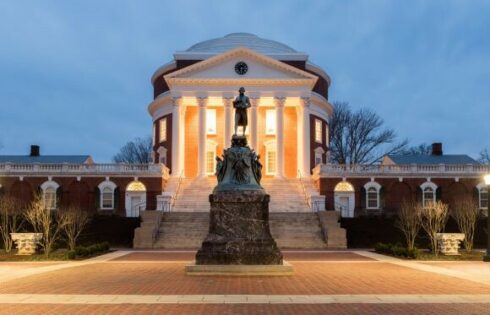
OPINION: By providing a platform to disseminate their values respectfully, organizations educate on conservative ideas and fight censorship
A University of Wisconsin Eau-Claire’s English Department chair was recently placed on administrative leave after allegedly flipping the College Republicans’ display.
The student GOP group was tabling in support of local candidates. Tatiana Bobrowicz, student chair of the UW-Eau Claire College Republicans, explained that Professor José Felipe Alvergue “came up and flipped our table in a violent attack toward us.”
As shocking as this may be, it is unfortunately not a unique nor isolated incident against conservative college groups. This is one of many examples from this semester that highlight the free speech infringements and cancel culture that conservative students frequently face.
For instance, earlier this semester, the University of Wisconsin-Madison’s administration canceled the blind conservative Dr. Timothy Cordes’ academic talk due to his outspoken political views. Similarly, the College of Sequoias removed sidewalk chalk messages from the campus’s Young Americans for Freedom chapter. Their messages included “God Bless America” and “stop mutilating trans kids.” The college called this “graffiti.”
The bias and censorship that conservative students face is evident. And those in support of this censorship have no problem denying this reality. According to a recent survey, 39 percent of Furman University’s undergraduates believe that “shutting down a speaker” is acceptable.
When broken down by political affiliation, those surveyed reported witnessing frequent or very frequent uncivil treatment of students with conservative views four times as often as those with liberal or progressive views.
On the other hand, liberal student groups have faced comparatively little, if any, pushback from universities. Concerningly, recent liberal protests on college campuses have not attracted much administrative oversight. While these protests may disrupt a university’s operations and security, they have not received intense administrative pushback akin to conservative organizations.
Consider the U.S. Department of Education’s recent investigations into 60 universities for “antisemitic discrimination and harassment.” These allegations of antisemitic activity stem “from anti-Israel campus protests nationwide following the Oct. 7, 2023, Hamas terrorist attacks on Israel.”
Secretary of Education Linda McMahon stated, “The Department is deeply disappointed that Jewish students studying on elite U.S. campuses continue to fear for their safety amid the relentless antisemitic eruptions that have severely disrupted campus life for more than a year. University leaders must do better.”
In a nation founded on constitutional safeguards, linkages between censorship and political organizing are scrutinized. These debates on censorship permeate modern discourses alongside the rise of “cancel culture,” a phenomenon simultaneously praised for censoring sensitive ideologies and condemned for stifling civil liberties.
What was once regarded as a place that fostered individuality, healthy debate, and pluralism, college campuses are now a place where only liberal viewpoints are deemed as acceptable.
This wields unwanted consequences, stifling the diversification of values in a pluralist liberal democracy. While alarming, the recent events should not deter conservative students from being outspoken about their values and collaborating with like-minded students. Instead, conservatives should feel emboldened to challenge administrative censorship on predominantly liberal campuses.
Organizations such as the Network of Enlightened Women (NeW), Turning Point USA, Young Americans for Freedom, and College Republicans, offer platforms for students to peacefully espouse their values. These groups bring community and diversity of thought to campuses.
By providing a platform to disseminate their values respectfully, such organizations educate on conservative ideas and fight censorship. This involvement empowers students and provides for a balance of viewpoints on campus. For example, NeW and the Leadership Institute hosted conservative activist Riley Gaines at the University of Illinois Urbana-Champaign in 2024, who spoke about female empowerment from a conservative lens.
Other organizations like Speech First ensure students’ free speech rights are protected on campus. It is one of the support systems for students, litigating in courtrooms for students victimized by bias. If conservative students are deterred from assembling on campus, this organization adopts “advocacy, litigation, and education” to ensure they are informed and well-equipped to express their values against unjust censorship.
Critically analyzing what materials are harmful versus unpopular can spur respectful intellectual discourse among competing perspectives. Striving to understand these opposing values can replace excessive censorship and cancel culture.
Alexandra Horwitz is a sophomore at the University of Illinois Urbana-Champaign, majoring in history and political science, and a student media fellow with the Network of enlightened Women.
MORE: ‘Born in the Right Body’: Why I share my detransition story
IMAGE CAPTION AND CREDIT: College students smile and carry an American flag / William Perugini, Shutterstock
Like The College Fix on Facebook / Follow us on Twitter





Please join the conversation about our stories on Facebook, Twitter, Instagram, Reddit, MeWe, Rumble, Gab, Minds and Gettr.